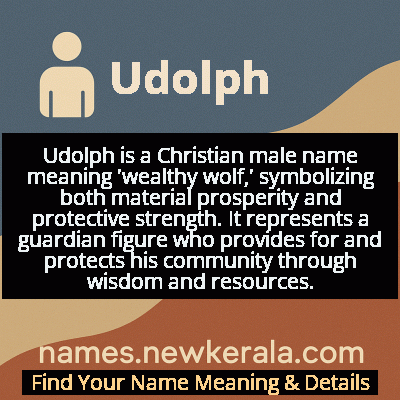Udolph Name Meaning & Details
Origin, Popularity, Numerology Analysis & Name Meaning of Udolph
Discover the origin, meaning, and cultural significance of the name UDOLPH. Delve into its historical roots and explore the lasting impact it has had on communities and traditions.
Name
Udolph
Gender
Male
Origin
Christian
Lucky Number
4
Meaning of the Name - Udolph
Udolph is a Christian male name meaning 'wealthy wolf,' symbolizing both material prosperity and protective strength. It represents a guardian figure who provides for and protects his community through wisdom and resources.
Udolph - Complete Numerology Analysis
Your Numerology Number
Based on Pythagorean Numerology System
Ruling Planet
Uranus (Rahu)
Positive Nature
Strong sense of order, loyal, practical, and disciplined.
Negative Traits
Stubborn, overly serious, rigid, and prone to feeling restricted.
Lucky Colours
Blue, gray.
Lucky Days
Saturday.
Lucky Stones
Blue sapphire.
Harmony Numbers
1, 7, 8.
Best Suited Professions
Managers, engineers, accountants, organizers.
What People Like About You
Dependability, discipline, practicality.
Famous People Named Udolph
Udolph of Magdeburg
Christian missionary
Early Christian missionary to Slavic peoples in Eastern Europe
Udolph von Wedel
German nobleman
Prominent landowner and patron of Lutheran churches in Pomerania
Udolph Schultze
Theologian
Lutheran pastor and religious writer who influenced German Protestant thought
Udolph van Heeckeren
Dutch diplomat
Notable European diplomat who served in Russian and Dutch diplomatic corps
Name Variations & International Equivalents
Click on blue names to explore their detailed meanings. Gray names with will be available soon.
Cultural & Historical Significance
The name maintained its aristocratic associations throughout the Renaissance and Reformation periods, particularly among German and Dutch Protestant families who valued its combination of traditional Germanic heritage with Christian identity. In Lutheran regions, the name became associated with steadfast faith and leadership, with several notable Udolphs serving as pastors, theologians, and religious patrons. The name's dual symbolism of prosperity and protective strength made it particularly appealing to noble families who saw themselves as both wealthy guardians of their lands and defenders of the Christian faith.
Extended Personality Analysis
Individuals named Udolph are typically perceived as possessing a unique blend of leadership qualities and protective instincts. They often exhibit the 'wolf-like' characteristics of loyalty to their family and community, combined with a strong sense of responsibility and provision. These individuals tend to be natural leaders who approach challenges with strategic thinking and determination, much like a wolf leading its pack. Their inherent sense of protection extends beyond physical safety to include emotional and financial security for those in their care, making them reliable and trustworthy figures in both personal and professional contexts.
The 'wealthy' aspect of the name's meaning often manifests in a practical, resource-oriented mindset. Udolphs are typically good managers of resources, whether financial, emotional, or intellectual. They possess an innate ability to build and maintain stability in their environments and are often drawn to roles where they can provide structure and security. While they may appear reserved or serious at first, those who know them well appreciate their deep commitment and the quiet strength they bring to relationships. Their combination of protective instincts and practical wisdom makes them excellent problem-solvers who can navigate complex situations with both courage and careful consideration.
Modern Usage & Popularity
In contemporary times, Udolph has become an extremely rare name, primarily preserved within specific European families as a traditional given name or used by parents seeking distinctive historical names with strong Germanic roots. The name sees occasional revival among families with German or Dutch heritage who wish to honor ancestral connections, though it remains outside mainstream naming trends. In recent decades, the name has appeared sporadically in Germany, the Netherlands, and among diaspora communities, particularly as part of a broader interest in reviving traditional Germanic names. However, its usage remains minimal compared to more popular wolf-related names like Wolfgang or Rudolph, with fewer than 5 recorded births annually in most Western countries.
Symbolic & Spiritual Meanings
Symbolically, Udolph represents the powerful combination of prosperity and protective strength. The wolf element symbolizes loyalty, family protection, intelligence, and strategic thinking—qualities associated with wolf pack behavior in nature. The wealth component extends beyond material riches to encompass abundance in relationships, wisdom, and spiritual resources. Together, these elements create a symbolic representation of a provider-protector figure who ensures the wellbeing of their community through both material means and vigilant care. In Christian contexts, the symbolism evolves to represent spiritual wealth and the protective nature of faith, with the wolf sometimes interpreted as a guardian of the flock against spiritual dangers, creating a rich tapestry of meaning that bridges earthly responsibility and spiritual guardianship.

